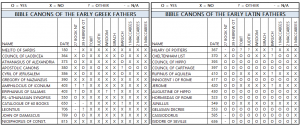All4Christ,
The short answer is that Protestant and Catholic printers marking books that they consider "noncanonical" seems to be an occasional or even normal practice in modern times, and for EO printers for about the last 70 years. Further, it seems a surprisingly (for me) occasional or even frequent POV in Eastern Christianity worldwide over many centuries to consider the Deuterocanon to be "noncanonical."
You are getting into three issues: 1. Including Noncanonical Books in Bibles, 2. Marking the Noncanonical Books, and 3. defining and considering the EO Deuterocanon (eg. 1-3 Maccabees, but not 4 Maccabees) as noncanonical.
1. Inclusion of Clearly Noncanonical Books.
First, occasionally over centuries, Bible codices included books that were noncanonical. An easy example is how some Greek Bibles included Josephus' writing, which was not canonical. A second easy example is 4 Esdras. Jerome wrote that it was Apocryphal, but he included it in his Vulgate Latin translation of the Bible anyway. SOURCE:
https://christiantruth.com/articles/articles-roman-catholicism/apocryphaintroduction/apocryphapart2/
AFAIK, there was no Western or Eastern Conciliar decision saying that 4 Esdras was "canonical", even though 4 Esdras was still getting included in Bibles, without getting marked uncanonical.
During the period following the invention of the Printing press, the Russian Bible printers used the Vulgate as a source for their Russian Bibles, so they included 4 Esdras, renaming it 3 Esdras. However, there was no official decision by the Russian Church labeling 4 Esdras "canonical."
4 Maccabees had a similar history in the Greek Church, with there being no official decision or patristic opinion that it was "canon." Yet it was included in Greek Bibles because the Greek printings used the Alexandrian codex as a template, and the Alexandrian Codex contained 4 Macc.
2. Marking Noncanonical books in EO Bibles.
The KJV put all the books they considered noncanonical in a section they titled Apocrypha.
In 1592, Pope Clement VIII, after the Council of Trent excluded 4 Esdras from the Catholic canon, put 4 Esdras in an "appendix" section.
In the mid-20th century, the Russian Synodal Edition of the Bible put asterisks next to all OT books outside the Protocanon (eg. 1-4 Maccabees are outside the Protocanon) and put a footnote for the asterisk saying that they were noncanonical. The Georgian Bible with the asterisks that I linked to is doing the same thing, marking 1-4 Macc etc. as noncanonical. The Greek Orthodox Bibles moved 4 Macc. to an appendix sometime in the last 100 years. I guess it was around 1970-1990.
IMO, marking noncanonical books is a fine practice, so long as the printer is correct in his evaluation of which ones are canonical.
3. Defining the canon.
Apparently, the Eastern tradition (eg. Laodicea and St Gregory the Theologian) has a more limited OT canon than the Western one (eg. St. Augustine and Carthage):
View attachment 307507
Asteriktos on the OC.net forum pointed me to this list of patristic Bible Book lists:
Ancient Canon Lists
Asteriktos wrote to me:
The Longer Catechism of The Orthodox, Catholic, Eastern Church • Pravoslavieto.com
Asteriktos also quoted to me numerous Eastern Father who agreed with the following letters-based Hebrew reasoning about the OT:
"The reason for reckoning twenty-two books of the Old Testament is that this corresponds with the number of the [Hebrew] letters. They are counted thus according to old tradition... To this some add Tobit and Judith to make twenty-four books, according to the number of the Greek letters, which is the language used among Hebrews and Greeks gathered in Rome." (St. Hilary of Poitiers, Exposition of the Psalms 15)
In my understanding of Orthodoxy, the Ecumenical Councils are the highest authority. The Quintsext E.C. of Trullo enumerated in Canon 2 Church fathers and local councils that gave lists of Bible Books, like some of those in the chart above. Trullo concluded that it (Trullo) affirmed those lists.
For purposes of this forum thread, suffice it to say that Trullo's book lists did not include 4 Macc, as P. Boumis' article on those lists reflects:
http://www.ecclesia.gr/greek/press/theologia/material/2007_2_5_Boumis.pdf
But to answer you more specifically, some of Trullo's book lists (eg. Carthage's list) had more books than others (eg. Laodicea). To generalize, the books in the longer pool of books (eg. books like Baruch) that are not in the shorter pool of books -the "Protocanon" (specifically the limited books of the rabbis and Protestants) - make up the EO "Deuterocanon." The term "Deuterocanon" by the way is a term created by Catholic theologians.
EOs as a whole don't seem to have a consensus on where the dividing line of the canon falls between these two "pools" of books accepted by Trullo. This is because Trullo did not explicitly specify where the dividing line lay. It simply stated that it accepted all of the conciliar and patristic book lists that it (Canon 2) mentioned. As a result, Canon 2 of Trullo could be read inclusively as including the Deuterocanon or exclusively as excluding the Deuterocanon. Boumis, in his article that I linked to above, interprets Trullo's lists inclusively and considers the EO Deuterocanon to be "canonical." In contrast, Russian Church common parlance seems to informally refer to all books outside the Protocanon as noncanonical, and typically does not use the term "Deuterocanon." The Orthodox Encyclopedia has a quite long article on this topic in detail here:
https://www.pravenc.ru/text/Канон библейский.html
The Catholic Church, by comparison, held their "Ecumenical" Council of Trent to solve the issue of the Canon's boundary. In the Catholic Church, all books that make up the Catholic "Deuterocanon" (eg. Tobit) definitely belong in the Catholic Canon, officially, as a result of Trent. So in the Catholic Church, it is clear and simple that "Deuterocanon + Protocanon = Canon." The Catholic Church by the way excludes a few books from the Catholic Canon that are in the "Deuterocanon" of the EO Church. One of them might be the Epistle of Jeremiah.

